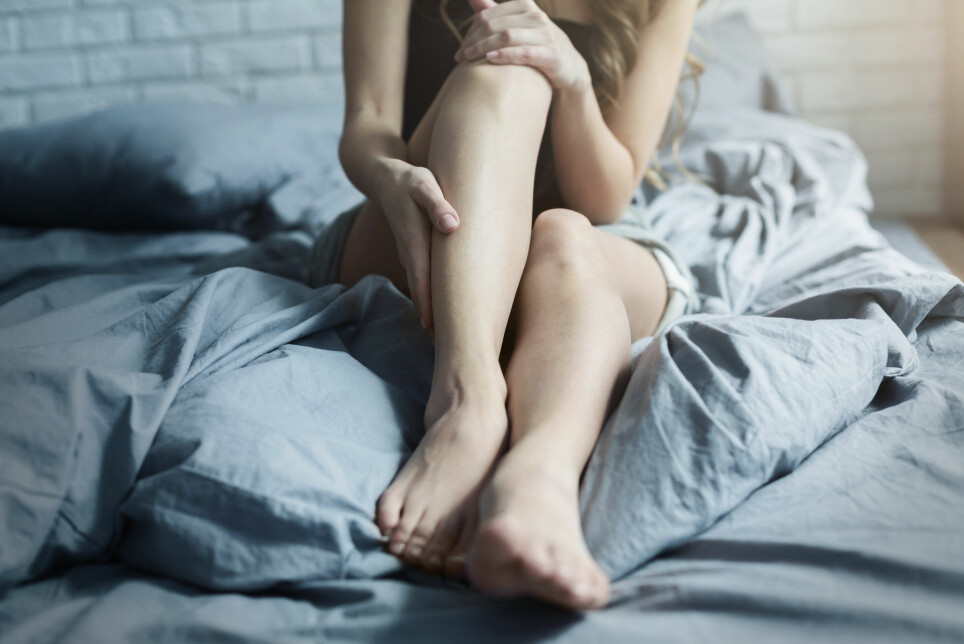
Why do some people get restless legs?
Many people are unaware that they have a neurological disorder.
Do you often get a crawling sensation in your legs? And does this give you an irresistible urge to move?
If this bothers you greatly, you may have the condition known as restless legs syndrome (RLS). RLS is in fact a neurological disorder. And it can affect both your quality of life and your sleep. That’s because symptoms often appear in the evening or at night.
“Many patients with this diagnosis complain of difficulties getting to sleep and restless nights, which in turn cause fatigue and sleepiness during the day,” writes Siri Waage in an e-mail to sciencenorway.no.
She is a coordinator for the Norwegian Competence Center for Sleep Disorders and a researcher at the University of Bergen.
Left undiagnosed
As many as one in seven Norwegians may have RLS, according to a Norwegian study from 2005.
The researchers phoned a random sample of people and asked them questions to identify whether they had the condition.
Notably, many people have never received such a diagnosis from a doctor. And some people experience this neurological condition more frequently than others.
If you are thinking that it typically affects teenage boys who can’t keep their legs still in the classroom, you would be wrong. Restless legs are in fact more common among women than men. And it affects older people more than the young.
A mystery
But what exactly causes this strange crawling sensation in the legs at certain times of the day or night?
“What happens inside the body of those who suffer from RLS remains a complicated mystery,” write the researchers behind a 2018 synopsis of the syndrome in The Lancet.
What we do know is that the condition is often hereditary. In other words, your genes may be a factor. Research also suggests that the neurotransmitter dopamine plays an important role. It appears that the brain and nervous system of those with RLS are unable to regulate dopamine levels properly.
Common among nurses
Waage and her colleagues have studied RLS among a specific group. In a 2012 study, they collected information about almost 1,800 nurses. As many as 27 per cent of them had restless legs.
Bearing in mind that RLS can cause sleep disorders, the researchers had an idea. Is it possible that the effect is in fact reversed?
Working nights
In other words, instead of restless legs causing sleep disorders, could poor sleep be triggering this bothersome syndrome?
Nurses work in shifts, and some have more night shifts than others.
“We know that shift work leads to sleep and circadian rhythm disruption, and working nights is particularly linked to shorter sleep cycles,” explains Waage.
Despite this, she did not find a link between RLS and night work.
Pregnancy, diabetes and alcohol consumption
Restless leg syndrome is also more common among other groups. Pregnant women and people with kidney disorders, diabetes or high alcohol consumption fall into this category.
When RLS coincides with another diagnosis, it is typically referred to as a secondary condition. By contrast, when a person gets RLS without having another disorder, it is called a primary condition. These two conditions are regarded as two separate disorders. However, the researchers behind the synopsis in The Lancet argue that this is an artificial distinction. More recent research suggests that both conditions are in fact the same disorder.
Important to test for iron deficiency
Nevertheless, one group of RLS sufferers stands out. Those who also suffer from iron deficiency may indeed benefit greatly from iron supplements. That’s why everyone who suffers from RLS should be tested for iron-deficiency anaemia.
Research also suggests that some patients’ brains may be iron deficient even when tests show normal levels in their blood.
Good sleep hygiene recommended
Other remedies may also help. Movement provides temporary relief. Good sleeping habits also help. Massaging your leg muscles can also be beneficial, according to the Norwegian National Advisory Unit on Sleep Disorders. Those who are severely affected can also be prescribed medication to increase dopamine levels in the brain.
———































